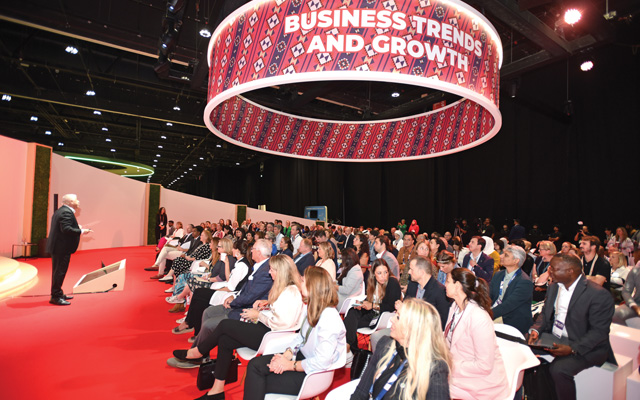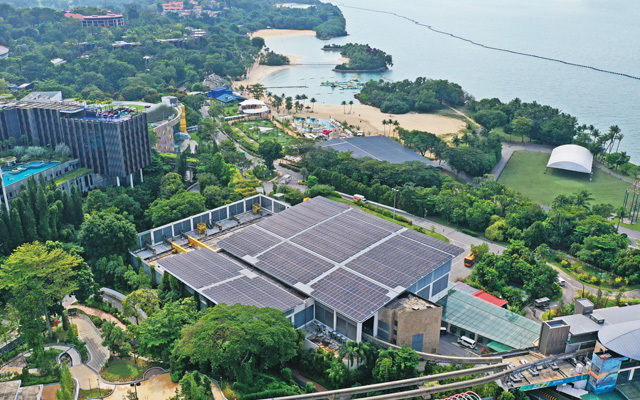There is growing attention on responsible events that deliver positive outcomes beyond the main business objectives, and this is shaping destination choice, event structure, and delegate experiences
Sustainability consciousness is sharper than ever among meeting and event planners, evident in increasingly common environmental and legacy initiatives being made part of professional gatherings.
At the 2024 ICCA Congress in Abu Dhabi, the global community of association meetings professionals implemented a high-performance sustainable event management system, which included initiatives around waste management, reduction in carbon emissions, attendee engagement, and detailed reporting on carbon footprint. Delegates were also given thermal water bottles as a functional keepsake that encourage a more responsible way of hydrating themselves throughout the event.

PATA, a Bangkok-based not-for-profit membership association that pushes for the responsible development of travel and tourism to, from, and within the Asia-Pacific region, has – for the first time – achieved carbon-neutral status for all of its in-person activities in 2024.
PATA has been able to offset the emissions from its events through projects in Cambodia, with support from PATA member Sustainable Travel International, a global non-profit organisation dedicated to promoting responsible tourism. Other operations, including training, staff travel, and office emissions, were offset in Thailand through the Thailand Greenhouse Gas Management Organisation.
To tackle emissions that cannot be fully eliminated, PATA supports credible carbon offset projects while simultaneously minimising emissions at the source. This includes exploring sustainable event design, optimising digital solutions to reduce travel-related emissions, and strengthening collaboration with venues and suppliers that prioritise sustainability.
Sustainability shapes event decisions
Edward Koh, executive director, conventions, meetings & incentive travel, Singapore Tourism Board, shares his observations that sustainability is increasingly becoming a top-of-mind concern, resulting in a growing demand for sustainable events as organisations prioritise the reduction of their environmental footprint to address pressing global concerns.
Responsible considerations will influence destination selection and event procurement decisions. Koh noted that the ICCA Meeting Needs Survey 2023 showed 44 per cent of international associations are incorporating sustainability and legacy into their RFPs.

He added: “Our efforts in sustainability have been recognised by MICE event organisers looking to hold their sustainability-related events with us. We have built a robust pipeline of green events in 2025 such as Asia Energy Week 2025, Carbon Forward Asia 2025, buildingSMART International Standards Summit 2025, Ecosperity Week 2025, AtoZero Asia 2025, International Conference of the International Society for Industrial Ecology 2025, Singapore Carbon Market & Investor Forum 2025, and Conference of the Electric Power Supply Industry 2025.”
Singapore’s resort island, Sentosa, has also seen its sustainability credentials and achievements giving it an advantage in the destination selection process.
Kelly Yoong, divisional director, corporate planning & development, Sentosa Development Corporation, told TTGmice that the organisation’s attainment of the Global Sustainable Tourism Council – For Destinations (GSTC-D) certificate in 2022 “has validated our sustainability commitment, resonating with event planners and international corporations where environmental responsibility is a key priority”.
“Our sustainability initiatives and achievements have enhanced Sentosa’s reputation as a destination that can meet diverse sustainability requirements for events of all scales,” said Yoong.
“In the past six months, this positioning has helped us secure several environmental conferences which champion sustainability and drive industry changes. The GSTC Global Summit, Blue Water Edufest, and IAAPA Sustainability Summit chose Sentosa as a location, partly for our green credentials.
“These events leveraged our island as a living classroom, where delegates experienced our sustainability initiatives firsthand – from environmentally-conscious venues and sustainable dining options to low carbon activities, showcasing our environmental projects in action. Our growing credibility in this space also attracted the Bureau of International Recycling Convention to host its welcome event on Sentosa.”

Yoong shared that interest in sustainability-related educational tours from corporate groups and conferences from various industries is on the rise.
“There is an increasing curiosity in sustainability management and the implementation of sustainability initiatives for a destination like Sentosa, with interest to observe real-life examples,” he said, adding that Sentosa also offers corporate social gatherings plenty of eco-conscious activities with a large dose of fun. Options include non-motorised races at the Skyline Luge Singapore and HyperDrive, water sports at Ola Beach Club, SentoSights tours for natural heritage exploration, and more.
Opportunity to do better
When asked if PATA’s quest for low-emissions in-person events directs it to consciously weigh bidding destinations’ environmental and emissions policies, CEO Noor Ahmad Hamid said: “While environmental credentials such as walkability and electric public transport are certainly advantageous, PATA represents a diverse membership of over 60 destinations – each at different stages of their sustainability journey.
“We believe it would be limiting and, perhaps, inequitable to consider only destinations that already meet ideal environmental standards. Instead, we assess each bid holistically. We are open to working with destinations that may not yet meet these benchmarks, but are committed to collaborating with us on implementing sustainable practices and reducing emissions. Our focus is on progress, not perfection.”
Noor added that “sustainability is not a one-size-fits-all approach”, and recognises that “every city operates within its own set of circumstances and constraints. Some are further along the path, while others are just beginning”.
As such, PATA is keen to use its events “as catalysts for positive change”.





















